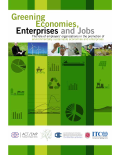
This resource guide provides an overview of the current sustainable development debate, the main environmental challenges and their implications for business, the greening of enterprises and workplaces, and the role that business and employers’ organizations can play in lobbying and service development in the environmental field.
It represents a major step forward in supporting and encouraging employers’ organizations and their members to take concrete actions towards more environmentally sustainable business development.
This publication is being launched at an opportune moment as the ILO has embarked on the “Green Initiative” as part of a reflection on the Future of Work in the lead up towards the ILO’s centenary in 2019. The Green Initiative aims at expanding the ILO’s knowledge base and strengthening its leadership in guiding constituents through the transition to more sustainable enterprises, economies and societies.

The ninth annual State of Green Business report continues the tradition of opening a window into how, and how much, companies are improving their environmental performance and how much their efforts are making a difference. It looks at both common measures (energy, waste and carbon) and some less-common ones (for example, company's low carbon investments over the past five years).
The report also discusses 10 top sustainable trends in circular economy, technology and supply chain, green infrastruture and mining practices, as well as carbon recycling and green jobs among others to highlight future green opportunities for businesses. Moreover, it provides a quantitative view of corporate performance, leadership, and market drivers.
The green growth transition will be large, system-wide and structural. In other words, a new industrial revolution. This will require new green growth policies that foster economic growth and development while ensuring that natural assets continue to provide the resources and environmental services on which our well-being relies (OECD, 2011). More and better evidence is needed to support the design of effective green growth policies and to understand their impact on the economy. This policy brief summarises the main policy implications of a two-year research programme, sponsored by the Global Green Growth Institute (GGGI), which aimed to contribute to the growing evidence base.
The issue note focuses on one aspect of the social consequences of green growth, the labour market aspect, bearing in mind the importance of differences across countries, particularly by level of development, with the hope that it can provide some ideas for improving policy formation and analysis. It discusses the analytical frameworks that have informed past economic analyses of the potential impact of various green growth policies on labour markets, suggesting possible directions for future development of models to enable better analysis of potential impacts (Section 2). It then sketches some of the implications of the various frameworks for the likely distributional impacts of green growth policies (Section 3). In Section 4, evidence from countries’ experience with environmental policies is considered, along with empirical work on the likely future impacts of green growth policies. This leads to a discussion of how to mitigate potential adverse impacts of green growth policies on workers and households (Section 5).
Recent discussions on the green economy in Tunisia happened at an opportune moment. The country currently faces increasing unemployment as well as increasing social and spatial inequalities and energy and environmental challenges; these are all matters of growing concern. It is therefore clear that Tunisia needs a new development model.
In this context, ECA’s report on Inclusive green economy and structural transformation in Tunisia explores the links and contribution of inclusive green economy policies to structural transformation in Tunisia. Taking into account the historical, cultural and political backdrop of the country, the report highlights the challenges faced by Tunisia in developing its green economy, in structural transformation and in sustainable development. The report also identifies opportunities and makes recommendations. This report is only available in French.
